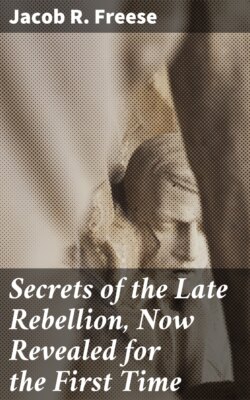Читать книгу Secrets of the Late Rebellion, Now Revealed for the First Time - Jacob R. Freese - Страница 20
На сайте Литреса книга снята с продажи.
SCENES.
ОглавлениеTable of Contents
IN the preceding chapter, mention is made of the fact that President Davis placed Colonel Newton Killgore on this same service; and in the same paragraph a brief account is given of his accomplishments, and the position he held in the United States army previous to the war. In this chapter we purpose to give a bird's-eye view of his services as conductor on this new line, for running the land blockade.
Not long after the time when Colonel Abercrombie had started on his first trip for Washington, President Davis sent for Colonel Killgore, and desired him to carry an order for arms and ammunition to Major Weightman, of Washington. He was directed, however, to await, at China Grove station, Colonel Abercrombie's return to that point, and then to go on or return to Richmond, according as the negotiation of Colonel Abercrombie had been successful or otherwise. Accordingly, when Messrs. Abercrombie, Lamb, and Waddell reached Mr. Randolph's, they found Colonel Killgore awaiting them. A consultation resulted in sending him forward on his mission with all convenient speed.
His general route was the same as that over which our three travellers had just passed; his stopping places the same; his guides the same; and in due time he found himself in the rooms of the Confederacy at Ben Beveridge's. Ben sent for Major Weightman. To him Colonel Killgore delivered his orders, letters, and verbal messages; received from the Major whatever of information and messages he had to send to President Davis, and within six hours was ready to start on his return trip for Richmond. He returned as he went, and within five days from the time of leaving Washington stood in the presence of Mr. Davis, ready to give an account of his mission. Everything had been done to the entire satisfaction of the President, and the Colonel was directed to hold himself in constant readiness for like orders.
After this, Colonel Killgore made frequent trips between Richmond and Washington. Of course he wore a disguise, and acted the part of a green country bumpkin: and so well did he wear the one, and assume the other, that never, but on two occasions, did he meet with incidents worthy of special record.
The first of these occurred as follows: After delivering messages and documents to Major Weightman, he proceeded to Baltimore, to deliver others to Mr. Thomas. While at the Fountain Hotel it chanced that his false moustache became loose, or somewhat disarranged. He stepped before a mirror, in the public reading-room, to readjust it, and, while doing so, observed a gentleman watching him very closely. Leaving that hotel instantly, he went to Barnum's, but was scarcely there before he noticed the same gentleman, who had watched him in the other hotel, again eyeing him closely. Soon the gentleman stepped up to him, and called him by his first name. The Colonel immediately recognized him as an old army friend, whom he had not seen for many years, and whom he had little thought to meet there, and under such circumstances. The gentleman was a Southerner; recognized, and entirely approved of the Colonel's new position as Ambassador Extraordinary between high contracting parties; and in a little while after they were drinking the health of each other, and confusion to their enemies. The Colonel at first feared that one of Baker's detectives had discovered his disguise while he was arranging his moustache, as before related, and felt not a little relieved when his observer turned out to be a friend instead of an enemy. He never again adjusted his false moustache in the reading-room of a hotel.
The other incident occurred as follows: He had been to Washington, and was on his return to Richmond. Crossing the Potomac, at a point above the Great Falls, he was accosted by a man on the Virginia side, who wanted to know where he had come from, and where he was going? Colonel Killgore replied that he lived in Maryland, not far from the Falls, and was on his way to visit a friend on the Virginia side. Other conversation followed, until the Colonel thought his questioner was satisfied, though he meanwhile had fully made up his mind that his questioner was none other than one of General Baker's secret detectives. The Colonel finally bade his questioner good-bye, and started to leave, when his questioner cried out, "Stop! I believe you are a spy—you are my prisoner!"
"No, I am not!" answered Colonel Killgore, and instantly sent a bullet whizzing into the brain of his questioner. The man fell, and died at once. An examination of the papers upon his person proved him to be, as the Colonel had suspected, one of the captains of General Baker's National Detective force. His body was left precisely where it fell, while Colonel Killgore proceeded on his journey, and in due time arrived in Richmond. When the body of the captain was found, some days after, it was discovered that a bullet had pierced his brain; but it was not known then, nor, except to a very few, was it ever known afterwards, who sent it there. This is the first publication of the real facts of the case, though the newspapers of the time were full of suppositions, not one of which was true, or anywhere near true.
Colonel Killgore continued one of the conductors on this line until the line was closed. After the war he returned to Charleston, studied law, was admitted to practice, and when last heard from was doing a large and successful business, and was regarded as among the first men of the State.
